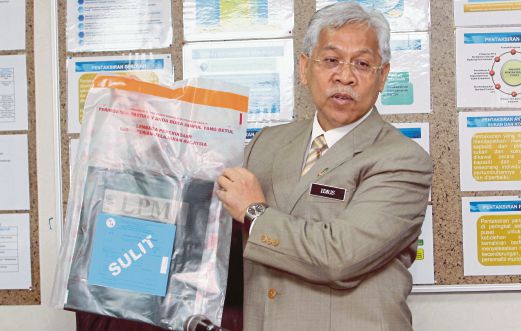Revive the ethos of education
Professor Tan Sri Dato' Dzulkifli Abdul Razak
Learning Curve: Perspective
New Sunday Times - 21-9-2014
OUR fears have come true. Members of the teaching profession are suspected to be involved in the Ujian Penilaian Sekolah Rendah (UPSR) papers leak.

| Second Education Minister Datuk Seri Idris Jusoh displays a sample of a plastic bag containing examination questions. |
This is most unfortunate because there are high expectations of teachers. While the culprits deserve condemnation, labelling teachers as “cheaters” is extreme and insensitive. All professions have their fair share of black sheep.
That said, teachers are a special group entrusted to shape the future of their students from a young age. No other profession has this privilege.
This is where the difference lies and the leaks, therefore, are a letdown. To add insult to injury, the leaks coincided with the Asean Ministers of Education meeting in Laos where Malaysia was chair.
But the damage is done. Deputy Prime Minister Tan Sri Muhyiddin Yassin, who is also Education Minister, said the image of Malaysia as an education hub is tainted.
It is best to exercise damage control with the long-term view that such embarrassment does not recur.
While it is logical to scrutinise work processes such as Standard of Procedures (SOPs) this is only the tip of the iceberg.
The remaining 90 per cent — the reasons for the breach of trust — are submerged in water.
If those reasons are not removed, SOPs cannot guarantee that there will be no more leaks.
It is in this context that the issue is most worrying because it implies that “education” itself is on soft ground where the practice of values is weakly grounded.
This is evident since a headmaster is allegedly part of the scam. It speaks volumes about the practice of ethics and moral values.
Or have we defined “success” in such a way that ethics and morality are not an integral part of it? That the leaks surfaced in the social media compounds the issue of ethics.
It is timely to talk about holistic student outcomes (HOSO) rather than fragmented academic versus non-academic outputs, especially at the UPSR level.
Over the years, the emphasis has been on academic performance alone based on one set of intelligences such that the whole person has been somewhat caricaturised as the model of success.
This notion is accepted as the one and only model, albeit with all the deficiencies embedded in it.
Similar to the economic measures of Gross Domestic Products stretched to falsely measure the state of human well-being, examination results too tend to be inflated.
Despite a glaring breach of intellect, we have grown to culturally accept the model as the “truth” — and pursue it relentlessly nationwide.
This so-called “truth” gets exploited by those who know no better. Often they are the gullible ones who look at education as a shortcut to so called “success” and the end justifies the means.
Therein lies the basic problem in what is seemingly a straightforward case of “cheating”. It is a stark challenge to the ethos of education.
Tightening processes is a good step in the right direction but it cannot be the final solution until the education ethos is in its rightful place.
The Education Blueprint recognises “ethics and spirituality” as one of the six student aspirations. But it must underpin the other five aspirations such as leadership, higher order thinking skills (HOTS), knowledge, bilingualism and national identity.
Without strong ethics and spirituality embedded as part of the processes of education, the aspiration to lead, for example, can be susceptible to corruption — it is worse if aided by HOTS with a focus on ways to cheat.
Ethics and spiritually must be the foundation of education in the country, and not merely another aspiration that is lowly prioritised. The UPSR leaks highlight that ethics and spirituality must be worked into the system by the end of Wave 1 of the transformation, that is a year from now.
This is to allow a solid foundation to move forward in an ethically-based education system with no more room for leaks in all sectors.
